Report on Organisational Behaviour: Shell Plc and Key Concepts
VerifiedAdded on 2022/12/29
|12
|4570
|4
Report
AI Summary
This report provides an analysis of organisational behaviour, focusing on the multinational company, Royal Dutch Shell Plc. It explores the impact of organisational culture, politics, and power on individuals and teams, utilizing Handy's culture model and the French and Raven model of power. The report then delves into motivational theories, including Maslow's hierarchy of needs and McGregor's Theory X and Theory Y, along with practical motivational techniques. It differentiates between effective and ineffective teams, highlighting factors that contribute to team success. Finally, it discusses philosophies of organisational behaviour within the context of Shell Plc, offering insights into how these concepts influence workplace dynamics and performance. The report aims to provide a comprehensive understanding of organisational behaviour principles and their application in a real-world business setting.
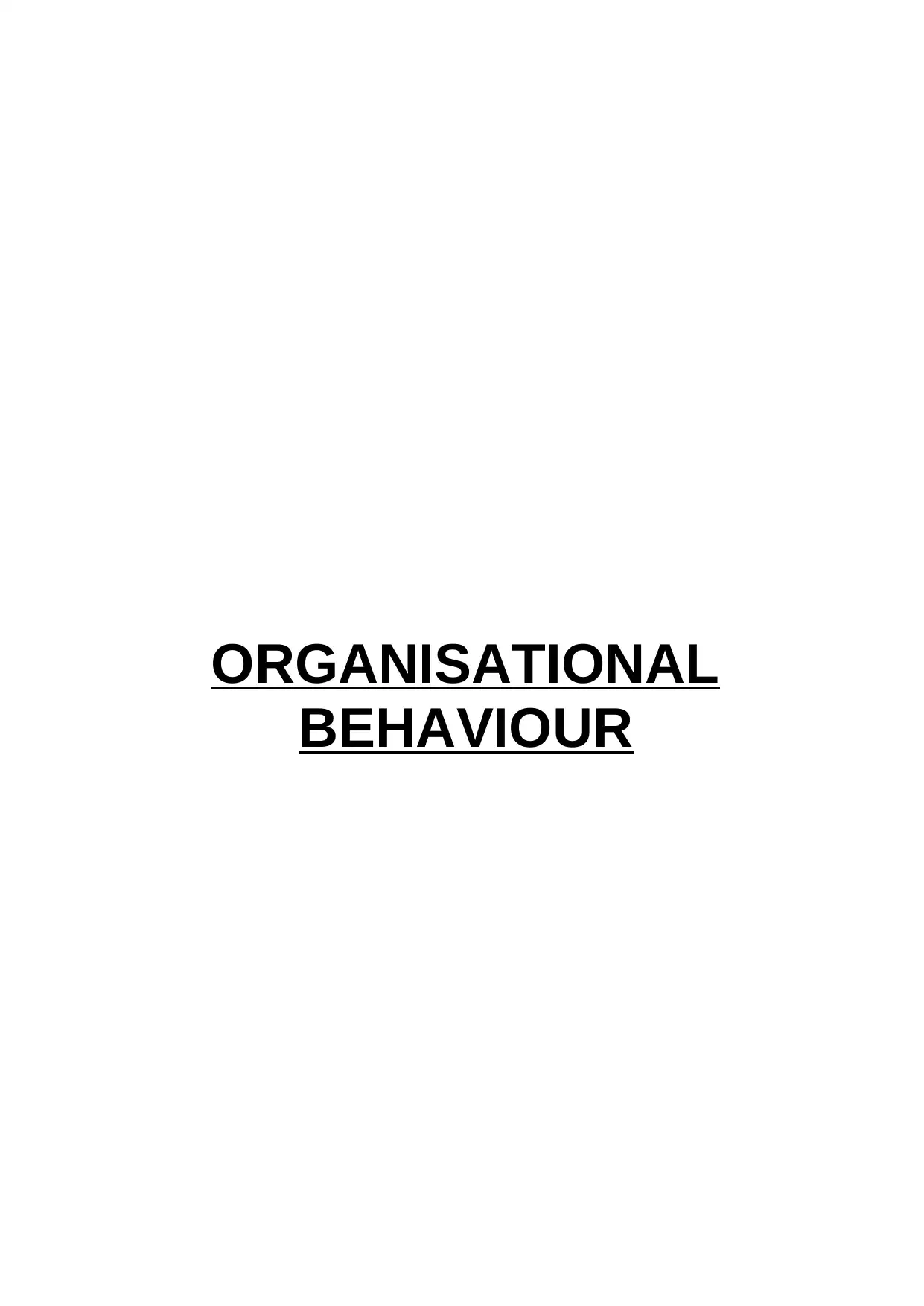
ORGANISATIONAL
BEHAVIOUR
BEHAVIOUR
Paraphrase This Document
Need a fresh take? Get an instant paraphrase of this document with our AI Paraphraser
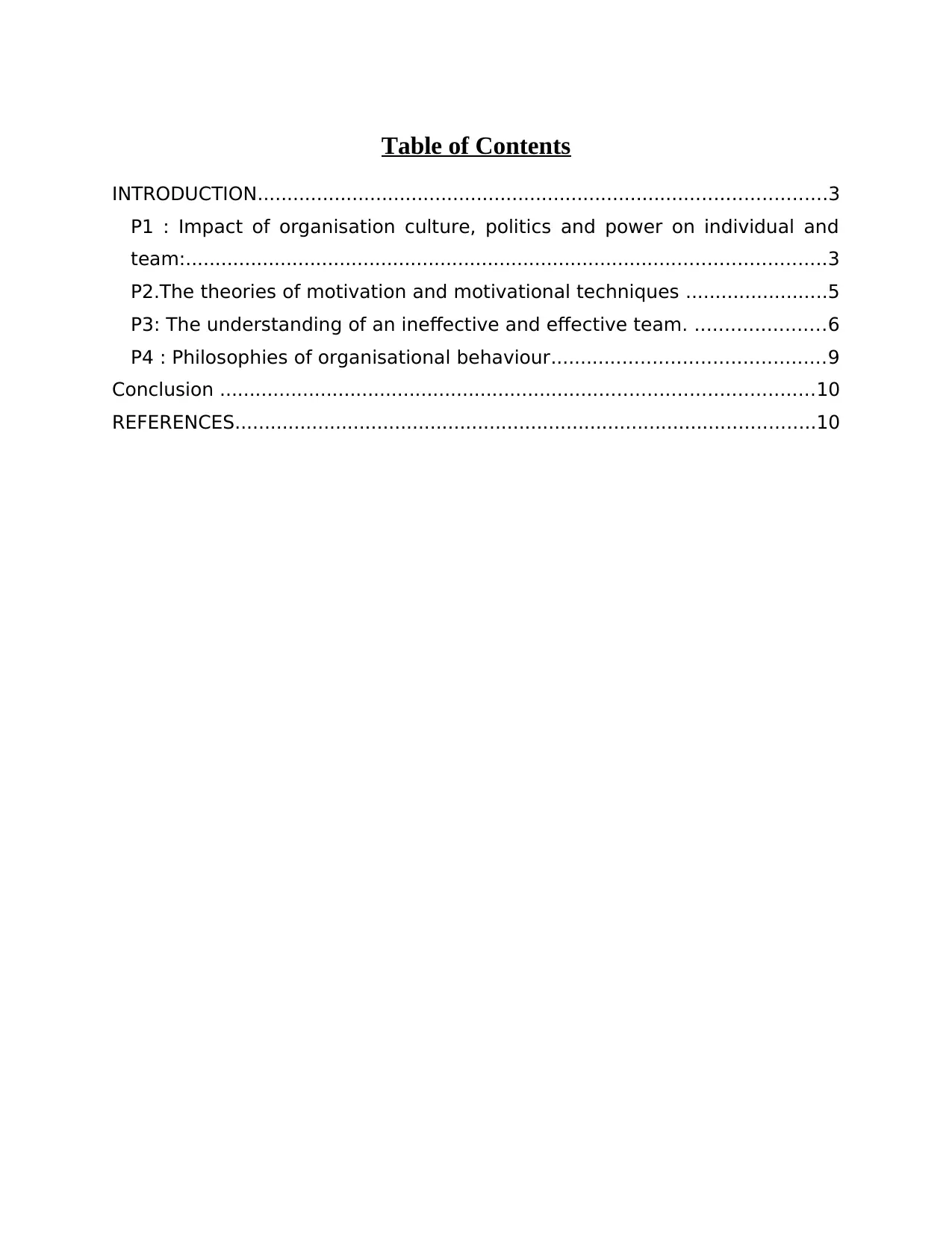
Table of Contents
INTRODUCTION................................................................................................3
P1 : Impact of organisation culture, politics and power on individual and
team:............................................................................................................3
P2.The theories of motivation and motivational techniques ........................5
P3: The understanding of an ineffective and effective team. ......................6
P4 : Philosophies of organisational behaviour..............................................9
Conclusion ....................................................................................................10
REFERENCES..................................................................................................10
INTRODUCTION................................................................................................3
P1 : Impact of organisation culture, politics and power on individual and
team:............................................................................................................3
P2.The theories of motivation and motivational techniques ........................5
P3: The understanding of an ineffective and effective team. ......................6
P4 : Philosophies of organisational behaviour..............................................9
Conclusion ....................................................................................................10
REFERENCES..................................................................................................10
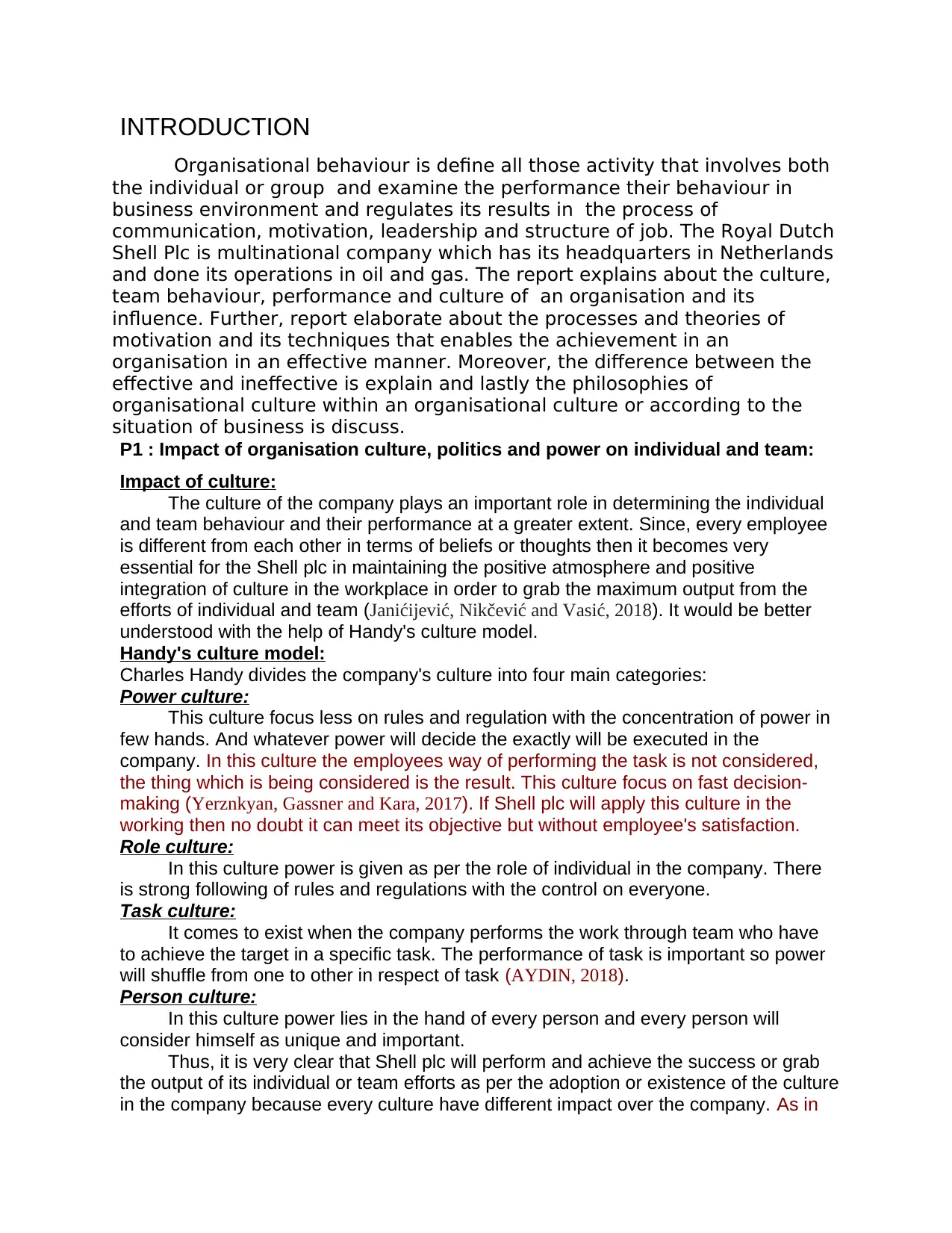
INTRODUCTION
Organisational behaviour is define all those activity that involves both
the individual or group and examine the performance their behaviour in
business environment and regulates its results in the process of
communication, motivation, leadership and structure of job. The Royal Dutch
Shell Plc is multinational company which has its headquarters in Netherlands
and done its operations in oil and gas. The report explains about the culture,
team behaviour, performance and culture of an organisation and its
influence. Further, report elaborate about the processes and theories of
motivation and its techniques that enables the achievement in an
organisation in an effective manner. Moreover, the difference between the
effective and ineffective is explain and lastly the philosophies of
organisational culture within an organisational culture or according to the
situation of business is discuss.
P1 : Impact of organisation culture, politics and power on individual and team:
Impact of culture:
The culture of the company plays an important role in determining the individual
and team behaviour and their performance at a greater extent. Since, every employee
is different from each other in terms of beliefs or thoughts then it becomes very
essential for the Shell plc in maintaining the positive atmosphere and positive
integration of culture in the workplace in order to grab the maximum output from the
efforts of individual and team (Janićijević, Nikčević and Vasić, 2018). It would be better
understood with the help of Handy's culture model.
Handy's culture model:
Charles Handy divides the company's culture into four main categories:
Power culture:
This culture focus less on rules and regulation with the concentration of power in
few hands. And whatever power will decide the exactly will be executed in the
company. In this culture the employees way of performing the task is not considered,
the thing which is being considered is the result. This culture focus on fast decision-
making (Yerznkyan, Gassner and Kara, 2017). If Shell plc will apply this culture in the
working then no doubt it can meet its objective but without employee's satisfaction.
Role culture:
In this culture power is given as per the role of individual in the company. There
is strong following of rules and regulations with the control on everyone.
Task culture:
It comes to exist when the company performs the work through team who have
to achieve the target in a specific task. The performance of task is important so power
will shuffle from one to other in respect of task (AYDIN, 2018).
Person culture:
In this culture power lies in the hand of every person and every person will
consider himself as unique and important.
Thus, it is very clear that Shell plc will perform and achieve the success or grab
the output of its individual or team efforts as per the adoption or existence of the culture
in the company because every culture have different impact over the company. As in
Organisational behaviour is define all those activity that involves both
the individual or group and examine the performance their behaviour in
business environment and regulates its results in the process of
communication, motivation, leadership and structure of job. The Royal Dutch
Shell Plc is multinational company which has its headquarters in Netherlands
and done its operations in oil and gas. The report explains about the culture,
team behaviour, performance and culture of an organisation and its
influence. Further, report elaborate about the processes and theories of
motivation and its techniques that enables the achievement in an
organisation in an effective manner. Moreover, the difference between the
effective and ineffective is explain and lastly the philosophies of
organisational culture within an organisational culture or according to the
situation of business is discuss.
P1 : Impact of organisation culture, politics and power on individual and team:
Impact of culture:
The culture of the company plays an important role in determining the individual
and team behaviour and their performance at a greater extent. Since, every employee
is different from each other in terms of beliefs or thoughts then it becomes very
essential for the Shell plc in maintaining the positive atmosphere and positive
integration of culture in the workplace in order to grab the maximum output from the
efforts of individual and team (Janićijević, Nikčević and Vasić, 2018). It would be better
understood with the help of Handy's culture model.
Handy's culture model:
Charles Handy divides the company's culture into four main categories:
Power culture:
This culture focus less on rules and regulation with the concentration of power in
few hands. And whatever power will decide the exactly will be executed in the
company. In this culture the employees way of performing the task is not considered,
the thing which is being considered is the result. This culture focus on fast decision-
making (Yerznkyan, Gassner and Kara, 2017). If Shell plc will apply this culture in the
working then no doubt it can meet its objective but without employee's satisfaction.
Role culture:
In this culture power is given as per the role of individual in the company. There
is strong following of rules and regulations with the control on everyone.
Task culture:
It comes to exist when the company performs the work through team who have
to achieve the target in a specific task. The performance of task is important so power
will shuffle from one to other in respect of task (AYDIN, 2018).
Person culture:
In this culture power lies in the hand of every person and every person will
consider himself as unique and important.
Thus, it is very clear that Shell plc will perform and achieve the success or grab
the output of its individual or team efforts as per the adoption or existence of the culture
in the company because every culture have different impact over the company. As in
⊘ This is a preview!⊘
Do you want full access?
Subscribe today to unlock all pages.

Trusted by 1+ million students worldwide
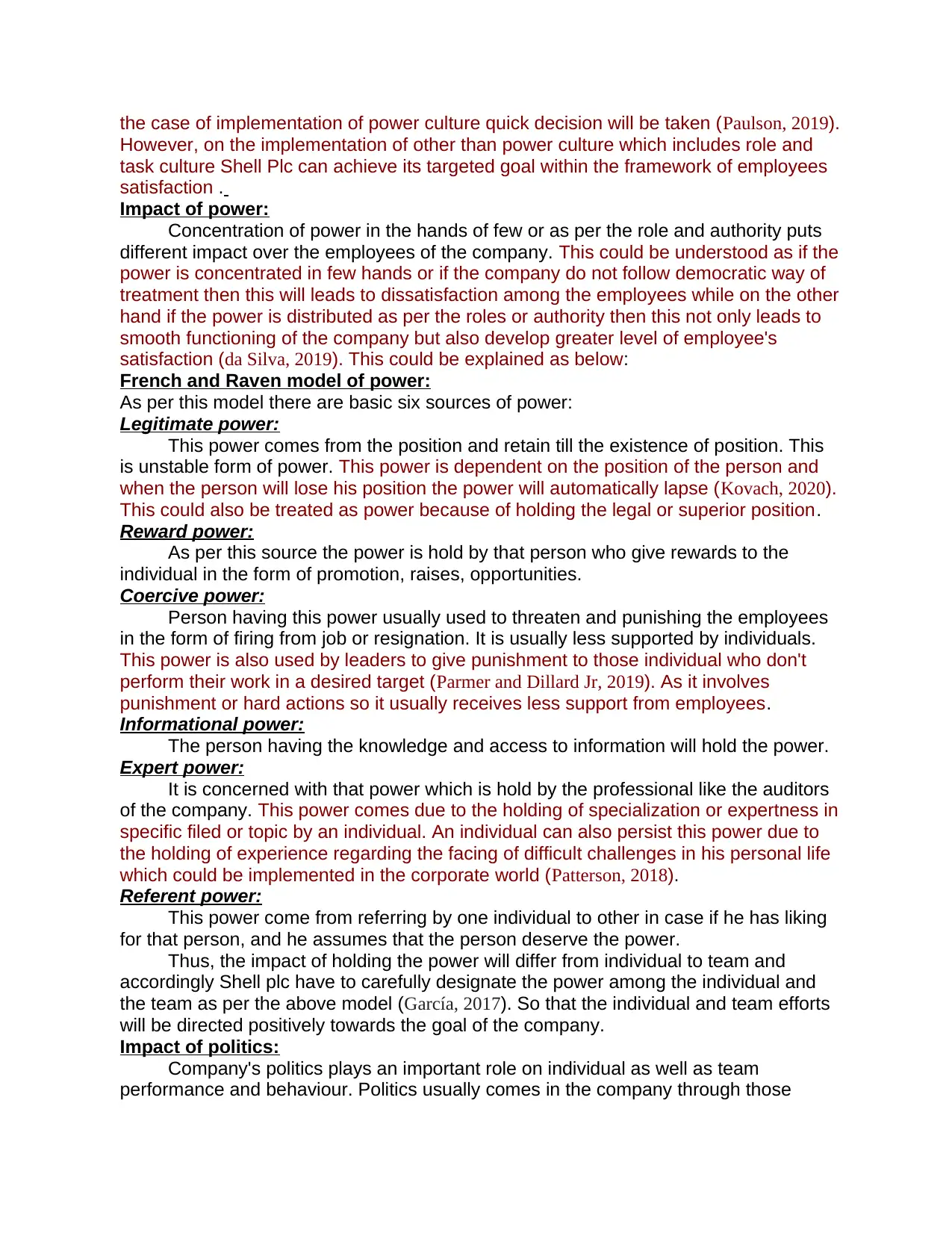
the case of implementation of power culture quick decision will be taken (Paulson, 2019).
However, on the implementation of other than power culture which includes role and
task culture Shell Plc can achieve its targeted goal within the framework of employees
satisfaction .
Impact of power:
Concentration of power in the hands of few or as per the role and authority puts
different impact over the employees of the company. This could be understood as if the
power is concentrated in few hands or if the company do not follow democratic way of
treatment then this will leads to dissatisfaction among the employees while on the other
hand if the power is distributed as per the roles or authority then this not only leads to
smooth functioning of the company but also develop greater level of employee's
satisfaction (da Silva, 2019). This could be explained as below:
French and Raven model of power:
As per this model there are basic six sources of power:
Legitimate power:
This power comes from the position and retain till the existence of position. This
is unstable form of power. This power is dependent on the position of the person and
when the person will lose his position the power will automatically lapse (Kovach, 2020).
This could also be treated as power because of holding the legal or superior position.
Reward power:
As per this source the power is hold by that person who give rewards to the
individual in the form of promotion, raises, opportunities.
Coercive power:
Person having this power usually used to threaten and punishing the employees
in the form of firing from job or resignation. It is usually less supported by individuals.
This power is also used by leaders to give punishment to those individual who don't
perform their work in a desired target (Parmer and Dillard Jr, 2019). As it involves
punishment or hard actions so it usually receives less support from employees.
Informational power:
The person having the knowledge and access to information will hold the power.
Expert power:
It is concerned with that power which is hold by the professional like the auditors
of the company. This power comes due to the holding of specialization or expertness in
specific filed or topic by an individual. An individual can also persist this power due to
the holding of experience regarding the facing of difficult challenges in his personal life
which could be implemented in the corporate world (Patterson, 2018).
Referent power:
This power come from referring by one individual to other in case if he has liking
for that person, and he assumes that the person deserve the power.
Thus, the impact of holding the power will differ from individual to team and
accordingly Shell plc have to carefully designate the power among the individual and
the team as per the above model (García, 2017). So that the individual and team efforts
will be directed positively towards the goal of the company.
Impact of politics:
Company's politics plays an important role on individual as well as team
performance and behaviour. Politics usually comes in the company through those
However, on the implementation of other than power culture which includes role and
task culture Shell Plc can achieve its targeted goal within the framework of employees
satisfaction .
Impact of power:
Concentration of power in the hands of few or as per the role and authority puts
different impact over the employees of the company. This could be understood as if the
power is concentrated in few hands or if the company do not follow democratic way of
treatment then this will leads to dissatisfaction among the employees while on the other
hand if the power is distributed as per the roles or authority then this not only leads to
smooth functioning of the company but also develop greater level of employee's
satisfaction (da Silva, 2019). This could be explained as below:
French and Raven model of power:
As per this model there are basic six sources of power:
Legitimate power:
This power comes from the position and retain till the existence of position. This
is unstable form of power. This power is dependent on the position of the person and
when the person will lose his position the power will automatically lapse (Kovach, 2020).
This could also be treated as power because of holding the legal or superior position.
Reward power:
As per this source the power is hold by that person who give rewards to the
individual in the form of promotion, raises, opportunities.
Coercive power:
Person having this power usually used to threaten and punishing the employees
in the form of firing from job or resignation. It is usually less supported by individuals.
This power is also used by leaders to give punishment to those individual who don't
perform their work in a desired target (Parmer and Dillard Jr, 2019). As it involves
punishment or hard actions so it usually receives less support from employees.
Informational power:
The person having the knowledge and access to information will hold the power.
Expert power:
It is concerned with that power which is hold by the professional like the auditors
of the company. This power comes due to the holding of specialization or expertness in
specific filed or topic by an individual. An individual can also persist this power due to
the holding of experience regarding the facing of difficult challenges in his personal life
which could be implemented in the corporate world (Patterson, 2018).
Referent power:
This power come from referring by one individual to other in case if he has liking
for that person, and he assumes that the person deserve the power.
Thus, the impact of holding the power will differ from individual to team and
accordingly Shell plc have to carefully designate the power among the individual and
the team as per the above model (García, 2017). So that the individual and team efforts
will be directed positively towards the goal of the company.
Impact of politics:
Company's politics plays an important role on individual as well as team
performance and behaviour. Politics usually comes in the company through those
Paraphrase This Document
Need a fresh take? Get an instant paraphrase of this document with our AI Paraphraser
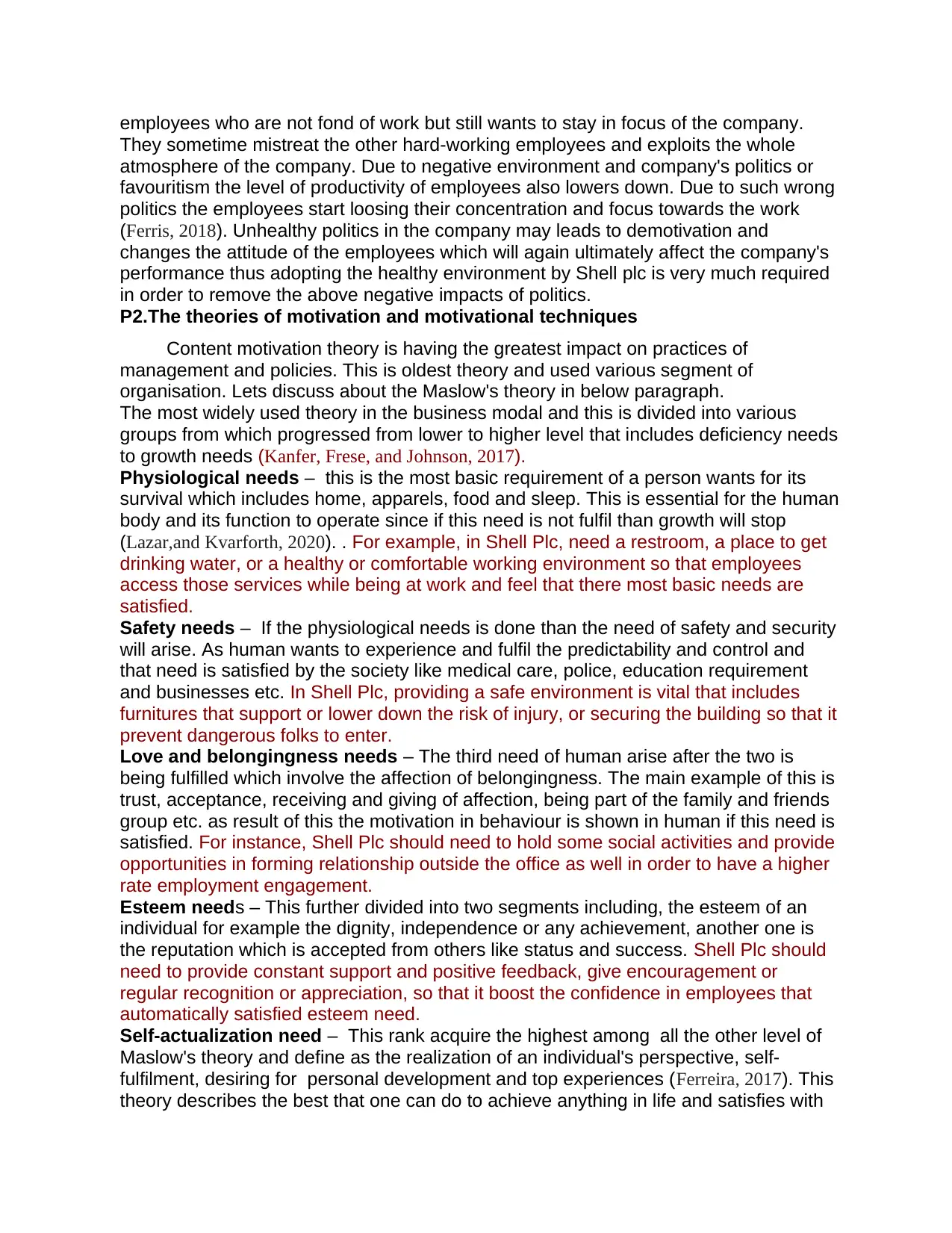
employees who are not fond of work but still wants to stay in focus of the company.
They sometime mistreat the other hard-working employees and exploits the whole
atmosphere of the company. Due to negative environment and company's politics or
favouritism the level of productivity of employees also lowers down. Due to such wrong
politics the employees start loosing their concentration and focus towards the work
(Ferris, 2018). Unhealthy politics in the company may leads to demotivation and
changes the attitude of the employees which will again ultimately affect the company's
performance thus adopting the healthy environment by Shell plc is very much required
in order to remove the above negative impacts of politics.
P2.The theories of motivation and motivational techniques
Content motivation theory is having the greatest impact on practices of
management and policies. This is oldest theory and used various segment of
organisation. Lets discuss about the Maslow's theory in below paragraph.
The most widely used theory in the business modal and this is divided into various
groups from which progressed from lower to higher level that includes deficiency needs
to growth needs (Kanfer, Frese, and Johnson, 2017).
Physiological needs – this is the most basic requirement of a person wants for its
survival which includes home, apparels, food and sleep. This is essential for the human
body and its function to operate since if this need is not fulfil than growth will stop
(Lazar,and Kvarforth, 2020). . For example, in Shell Plc, need a restroom, a place to get
drinking water, or a healthy or comfortable working environment so that employees
access those services while being at work and feel that there most basic needs are
satisfied.
Safety needs – If the physiological needs is done than the need of safety and security
will arise. As human wants to experience and fulfil the predictability and control and
that need is satisfied by the society like medical care, police, education requirement
and businesses etc. In Shell Plc, providing a safe environment is vital that includes
furnitures that support or lower down the risk of injury, or securing the building so that it
prevent dangerous folks to enter.
Love and belongingness needs – The third need of human arise after the two is
being fulfilled which involve the affection of belongingness. The main example of this is
trust, acceptance, receiving and giving of affection, being part of the family and friends
group etc. as result of this the motivation in behaviour is shown in human if this need is
satisfied. For instance, Shell Plc should need to hold some social activities and provide
opportunities in forming relationship outside the office as well in order to have a higher
rate employment engagement.
Esteem needs – This further divided into two segments including, the esteem of an
individual for example the dignity, independence or any achievement, another one is
the reputation which is accepted from others like status and success. Shell Plc should
need to provide constant support and positive feedback, give encouragement or
regular recognition or appreciation, so that it boost the confidence in employees that
automatically satisfied esteem need.
Self-actualization need – This rank acquire the highest among all the other level of
Maslow's theory and define as the realization of an individual's perspective, self-
fulfilment, desiring for personal development and top experiences (Ferreira, 2017). This
theory describes the best that one can do to achieve anything in life and satisfies with
They sometime mistreat the other hard-working employees and exploits the whole
atmosphere of the company. Due to negative environment and company's politics or
favouritism the level of productivity of employees also lowers down. Due to such wrong
politics the employees start loosing their concentration and focus towards the work
(Ferris, 2018). Unhealthy politics in the company may leads to demotivation and
changes the attitude of the employees which will again ultimately affect the company's
performance thus adopting the healthy environment by Shell plc is very much required
in order to remove the above negative impacts of politics.
P2.The theories of motivation and motivational techniques
Content motivation theory is having the greatest impact on practices of
management and policies. This is oldest theory and used various segment of
organisation. Lets discuss about the Maslow's theory in below paragraph.
The most widely used theory in the business modal and this is divided into various
groups from which progressed from lower to higher level that includes deficiency needs
to growth needs (Kanfer, Frese, and Johnson, 2017).
Physiological needs – this is the most basic requirement of a person wants for its
survival which includes home, apparels, food and sleep. This is essential for the human
body and its function to operate since if this need is not fulfil than growth will stop
(Lazar,and Kvarforth, 2020). . For example, in Shell Plc, need a restroom, a place to get
drinking water, or a healthy or comfortable working environment so that employees
access those services while being at work and feel that there most basic needs are
satisfied.
Safety needs – If the physiological needs is done than the need of safety and security
will arise. As human wants to experience and fulfil the predictability and control and
that need is satisfied by the society like medical care, police, education requirement
and businesses etc. In Shell Plc, providing a safe environment is vital that includes
furnitures that support or lower down the risk of injury, or securing the building so that it
prevent dangerous folks to enter.
Love and belongingness needs – The third need of human arise after the two is
being fulfilled which involve the affection of belongingness. The main example of this is
trust, acceptance, receiving and giving of affection, being part of the family and friends
group etc. as result of this the motivation in behaviour is shown in human if this need is
satisfied. For instance, Shell Plc should need to hold some social activities and provide
opportunities in forming relationship outside the office as well in order to have a higher
rate employment engagement.
Esteem needs – This further divided into two segments including, the esteem of an
individual for example the dignity, independence or any achievement, another one is
the reputation which is accepted from others like status and success. Shell Plc should
need to provide constant support and positive feedback, give encouragement or
regular recognition or appreciation, so that it boost the confidence in employees that
automatically satisfied esteem need.
Self-actualization need – This rank acquire the highest among all the other level of
Maslow's theory and define as the realization of an individual's perspective, self-
fulfilment, desiring for personal development and top experiences (Ferreira, 2017). This
theory describes the best that one can do to achieve anything in life and satisfies with
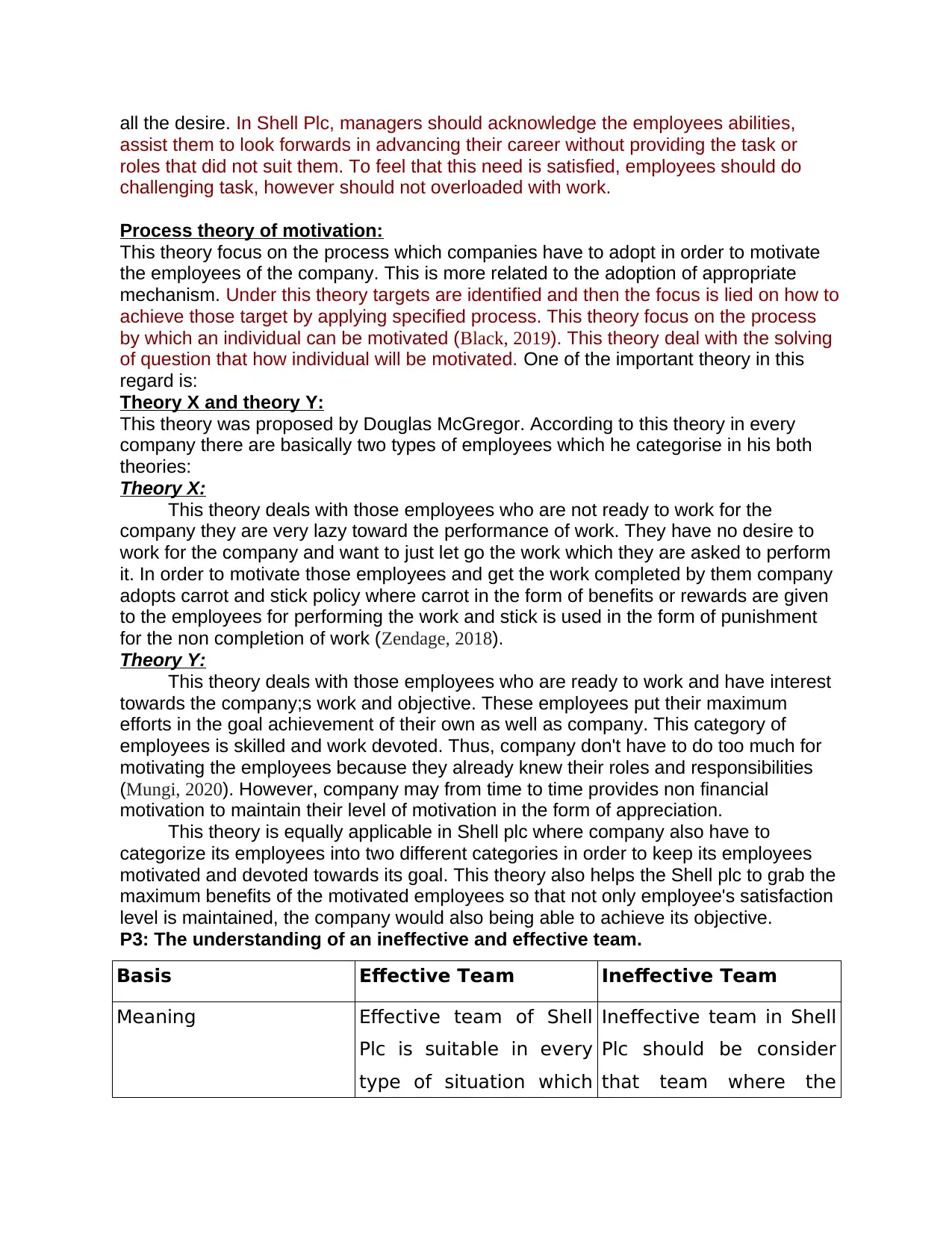
all the desire. In Shell Plc, managers should acknowledge the employees abilities,
assist them to look forwards in advancing their career without providing the task or
roles that did not suit them. To feel that this need is satisfied, employees should do
challenging task, however should not overloaded with work.
Process theory of motivation:
This theory focus on the process which companies have to adopt in order to motivate
the employees of the company. This is more related to the adoption of appropriate
mechanism. Under this theory targets are identified and then the focus is lied on how to
achieve those target by applying specified process. This theory focus on the process
by which an individual can be motivated (Black, 2019). This theory deal with the solving
of question that how individual will be motivated. One of the important theory in this
regard is:
Theory X and theory Y:
This theory was proposed by Douglas McGregor. According to this theory in every
company there are basically two types of employees which he categorise in his both
theories:
Theory X:
This theory deals with those employees who are not ready to work for the
company they are very lazy toward the performance of work. They have no desire to
work for the company and want to just let go the work which they are asked to perform
it. In order to motivate those employees and get the work completed by them company
adopts carrot and stick policy where carrot in the form of benefits or rewards are given
to the employees for performing the work and stick is used in the form of punishment
for the non completion of work (Zendage, 2018).
Theory Y:
This theory deals with those employees who are ready to work and have interest
towards the company;s work and objective. These employees put their maximum
efforts in the goal achievement of their own as well as company. This category of
employees is skilled and work devoted. Thus, company don't have to do too much for
motivating the employees because they already knew their roles and responsibilities
(Mungi, 2020). However, company may from time to time provides non financial
motivation to maintain their level of motivation in the form of appreciation.
This theory is equally applicable in Shell plc where company also have to
categorize its employees into two different categories in order to keep its employees
motivated and devoted towards its goal. This theory also helps the Shell plc to grab the
maximum benefits of the motivated employees so that not only employee's satisfaction
level is maintained, the company would also being able to achieve its objective.
P3: The understanding of an ineffective and effective team.
Basis Effective Team Ineffective Team
Meaning Effective team of Shell
Plc is suitable in every
type of situation which
Ineffective team in Shell
Plc should be consider
that team where the
assist them to look forwards in advancing their career without providing the task or
roles that did not suit them. To feel that this need is satisfied, employees should do
challenging task, however should not overloaded with work.
Process theory of motivation:
This theory focus on the process which companies have to adopt in order to motivate
the employees of the company. This is more related to the adoption of appropriate
mechanism. Under this theory targets are identified and then the focus is lied on how to
achieve those target by applying specified process. This theory focus on the process
by which an individual can be motivated (Black, 2019). This theory deal with the solving
of question that how individual will be motivated. One of the important theory in this
regard is:
Theory X and theory Y:
This theory was proposed by Douglas McGregor. According to this theory in every
company there are basically two types of employees which he categorise in his both
theories:
Theory X:
This theory deals with those employees who are not ready to work for the
company they are very lazy toward the performance of work. They have no desire to
work for the company and want to just let go the work which they are asked to perform
it. In order to motivate those employees and get the work completed by them company
adopts carrot and stick policy where carrot in the form of benefits or rewards are given
to the employees for performing the work and stick is used in the form of punishment
for the non completion of work (Zendage, 2018).
Theory Y:
This theory deals with those employees who are ready to work and have interest
towards the company;s work and objective. These employees put their maximum
efforts in the goal achievement of their own as well as company. This category of
employees is skilled and work devoted. Thus, company don't have to do too much for
motivating the employees because they already knew their roles and responsibilities
(Mungi, 2020). However, company may from time to time provides non financial
motivation to maintain their level of motivation in the form of appreciation.
This theory is equally applicable in Shell plc where company also have to
categorize its employees into two different categories in order to keep its employees
motivated and devoted towards its goal. This theory also helps the Shell plc to grab the
maximum benefits of the motivated employees so that not only employee's satisfaction
level is maintained, the company would also being able to achieve its objective.
P3: The understanding of an ineffective and effective team.
Basis Effective Team Ineffective Team
Meaning Effective team of Shell
Plc is suitable in every
type of situation which
Ineffective team in Shell
Plc should be consider
that team where the
⊘ This is a preview!⊘
Do you want full access?
Subscribe today to unlock all pages.

Trusted by 1+ million students worldwide
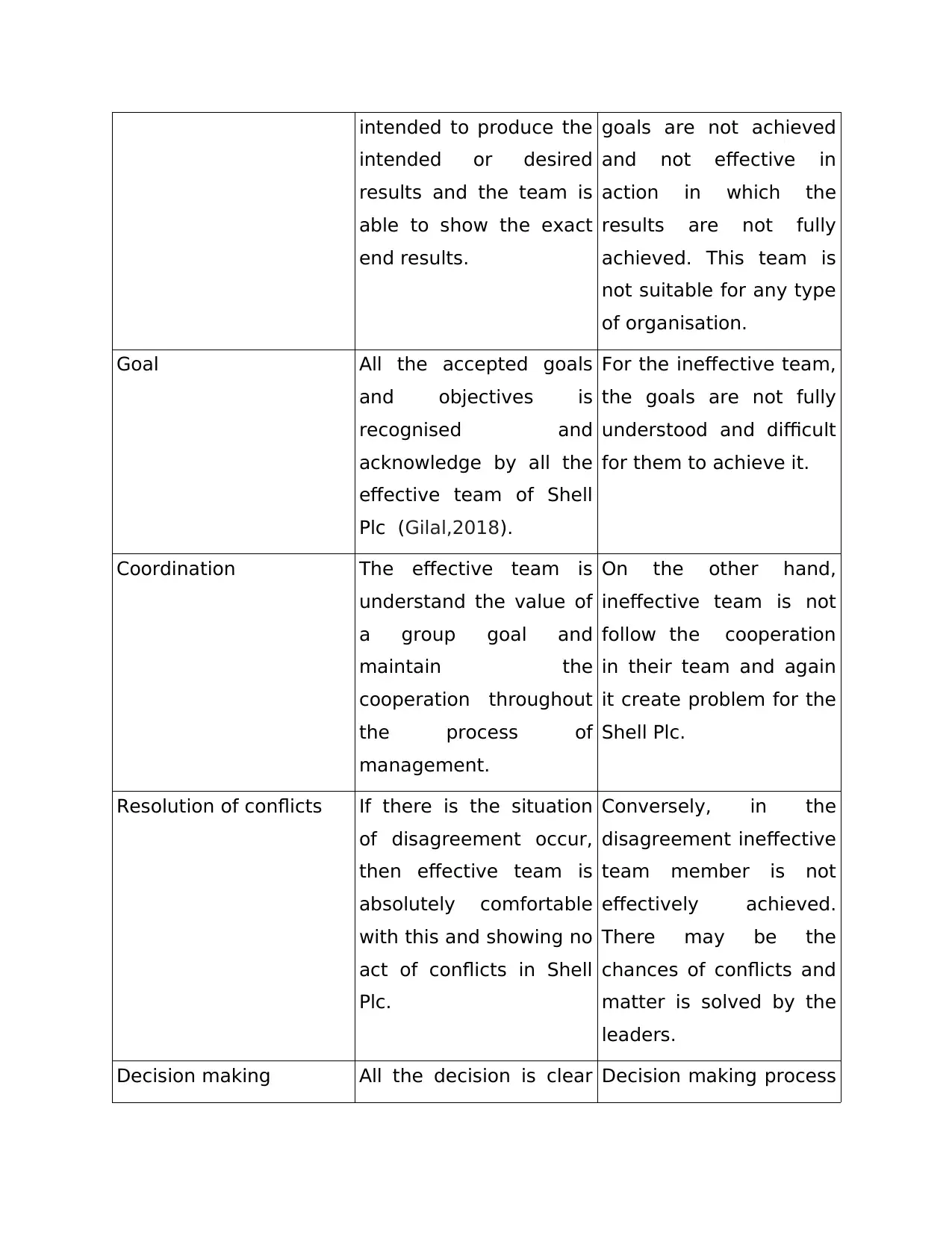
intended to produce the
intended or desired
results and the team is
able to show the exact
end results.
goals are not achieved
and not effective in
action in which the
results are not fully
achieved. This team is
not suitable for any type
of organisation.
Goal All the accepted goals
and objectives is
recognised and
acknowledge by all the
effective team of Shell
Plc (Gilal,2018).
For the ineffective team,
the goals are not fully
understood and difficult
for them to achieve it.
Coordination The effective team is
understand the value of
a group goal and
maintain the
cooperation throughout
the process of
management.
On the other hand,
ineffective team is not
follow the cooperation
in their team and again
it create problem for the
Shell Plc.
Resolution of conflicts If there is the situation
of disagreement occur,
then effective team is
absolutely comfortable
with this and showing no
act of conflicts in Shell
Plc.
Conversely, in the
disagreement ineffective
team member is not
effectively achieved.
There may be the
chances of conflicts and
matter is solved by the
leaders.
Decision making All the decision is clear Decision making process
intended or desired
results and the team is
able to show the exact
end results.
goals are not achieved
and not effective in
action in which the
results are not fully
achieved. This team is
not suitable for any type
of organisation.
Goal All the accepted goals
and objectives is
recognised and
acknowledge by all the
effective team of Shell
Plc (Gilal,2018).
For the ineffective team,
the goals are not fully
understood and difficult
for them to achieve it.
Coordination The effective team is
understand the value of
a group goal and
maintain the
cooperation throughout
the process of
management.
On the other hand,
ineffective team is not
follow the cooperation
in their team and again
it create problem for the
Shell Plc.
Resolution of conflicts If there is the situation
of disagreement occur,
then effective team is
absolutely comfortable
with this and showing no
act of conflicts in Shell
Plc.
Conversely, in the
disagreement ineffective
team member is not
effectively achieved.
There may be the
chances of conflicts and
matter is solved by the
leaders.
Decision making All the decision is clear Decision making process
Paraphrase This Document
Need a fresh take? Get an instant paraphrase of this document with our AI Paraphraser
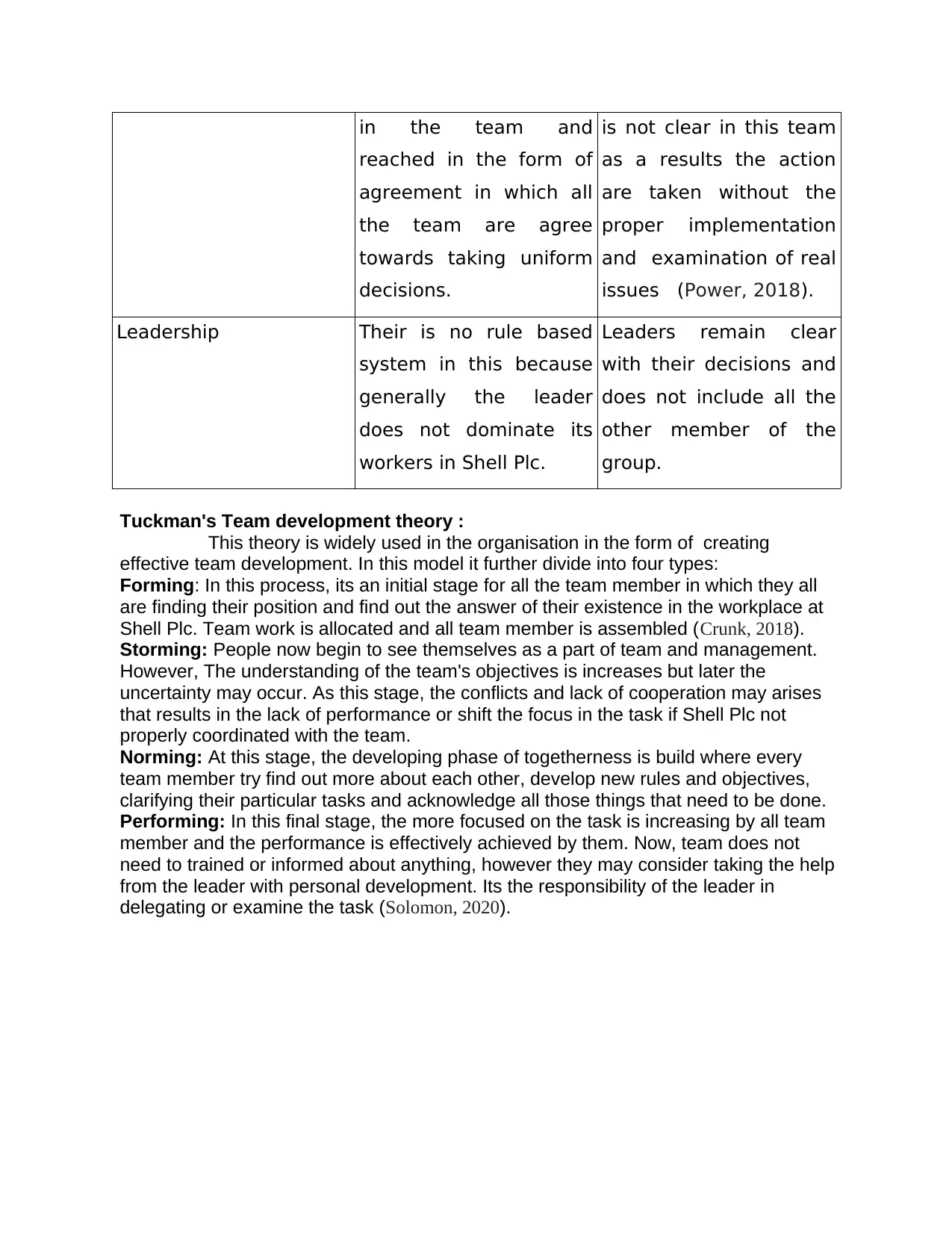
in the team and
reached in the form of
agreement in which all
the team are agree
towards taking uniform
decisions.
is not clear in this team
as a results the action
are taken without the
proper implementation
and examination of real
issues (Power, 2018).
Leadership Their is no rule based
system in this because
generally the leader
does not dominate its
workers in Shell Plc.
Leaders remain clear
with their decisions and
does not include all the
other member of the
group.
Tuckman's Team development theory :
This theory is widely used in the organisation in the form of creating
effective team development. In this model it further divide into four types:
Forming: In this process, its an initial stage for all the team member in which they all
are finding their position and find out the answer of their existence in the workplace at
Shell Plc. Team work is allocated and all team member is assembled (Crunk, 2018).
Storming: People now begin to see themselves as a part of team and management.
However, The understanding of the team's objectives is increases but later the
uncertainty may occur. As this stage, the conflicts and lack of cooperation may arises
that results in the lack of performance or shift the focus in the task if Shell Plc not
properly coordinated with the team.
Norming: At this stage, the developing phase of togetherness is build where every
team member try find out more about each other, develop new rules and objectives,
clarifying their particular tasks and acknowledge all those things that need to be done.
Performing: In this final stage, the more focused on the task is increasing by all team
member and the performance is effectively achieved by them. Now, team does not
need to trained or informed about anything, however they may consider taking the help
from the leader with personal development. Its the responsibility of the leader in
delegating or examine the task (Solomon, 2020).
reached in the form of
agreement in which all
the team are agree
towards taking uniform
decisions.
is not clear in this team
as a results the action
are taken without the
proper implementation
and examination of real
issues (Power, 2018).
Leadership Their is no rule based
system in this because
generally the leader
does not dominate its
workers in Shell Plc.
Leaders remain clear
with their decisions and
does not include all the
other member of the
group.
Tuckman's Team development theory :
This theory is widely used in the organisation in the form of creating
effective team development. In this model it further divide into four types:
Forming: In this process, its an initial stage for all the team member in which they all
are finding their position and find out the answer of their existence in the workplace at
Shell Plc. Team work is allocated and all team member is assembled (Crunk, 2018).
Storming: People now begin to see themselves as a part of team and management.
However, The understanding of the team's objectives is increases but later the
uncertainty may occur. As this stage, the conflicts and lack of cooperation may arises
that results in the lack of performance or shift the focus in the task if Shell Plc not
properly coordinated with the team.
Norming: At this stage, the developing phase of togetherness is build where every
team member try find out more about each other, develop new rules and objectives,
clarifying their particular tasks and acknowledge all those things that need to be done.
Performing: In this final stage, the more focused on the task is increasing by all team
member and the performance is effectively achieved by them. Now, team does not
need to trained or informed about anything, however they may consider taking the help
from the leader with personal development. Its the responsibility of the leader in
delegating or examine the task (Solomon, 2020).
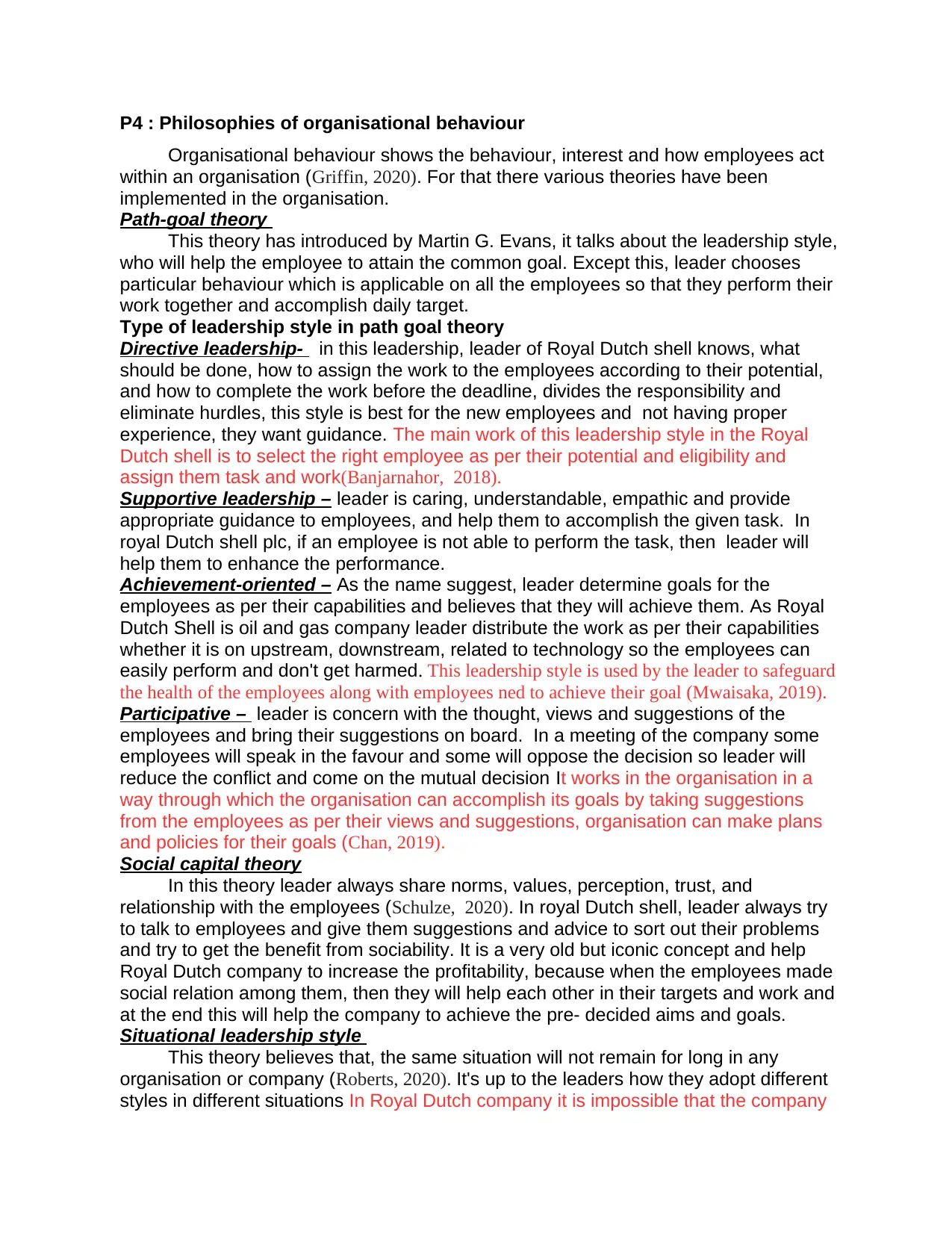
P4 : Philosophies of organisational behaviour
Organisational behaviour shows the behaviour, interest and how employees act
within an organisation (Griffin, 2020). For that there various theories have been
implemented in the organisation.
Path-goal theory
This theory has introduced by Martin G. Evans, it talks about the leadership style,
who will help the employee to attain the common goal. Except this, leader chooses
particular behaviour which is applicable on all the employees so that they perform their
work together and accomplish daily target.
Type of leadership style in path goal theory
Directive leadership- in this leadership, leader of Royal Dutch shell knows, what
should be done, how to assign the work to the employees according to their potential,
and how to complete the work before the deadline, divides the responsibility and
eliminate hurdles, this style is best for the new employees and not having proper
experience, they want guidance. The main work of this leadership style in the Royal
Dutch shell is to select the right employee as per their potential and eligibility and
assign them task and work(Banjarnahor, 2018).
Supportive leadership – leader is caring, understandable, empathic and provide
appropriate guidance to employees, and help them to accomplish the given task. In
royal Dutch shell plc, if an employee is not able to perform the task, then leader will
help them to enhance the performance.
Achievement-oriented – As the name suggest, leader determine goals for the
employees as per their capabilities and believes that they will achieve them. As Royal
Dutch Shell is oil and gas company leader distribute the work as per their capabilities
whether it is on upstream, downstream, related to technology so the employees can
easily perform and don't get harmed. This leadership style is used by the leader to safeguard
the health of the employees along with employees ned to achieve their goal (Mwaisaka, 2019).
Participative – leader is concern with the thought, views and suggestions of the
employees and bring their suggestions on board. In a meeting of the company some
employees will speak in the favour and some will oppose the decision so leader will
reduce the conflict and come on the mutual decision It works in the organisation in a
way through which the organisation can accomplish its goals by taking suggestions
from the employees as per their views and suggestions, organisation can make plans
and policies for their goals (Chan, 2019).
Social capital theory
In this theory leader always share norms, values, perception, trust, and
relationship with the employees (Schulze, 2020). In royal Dutch shell, leader always try
to talk to employees and give them suggestions and advice to sort out their problems
and try to get the benefit from sociability. It is a very old but iconic concept and help
Royal Dutch company to increase the profitability, because when the employees made
social relation among them, then they will help each other in their targets and work and
at the end this will help the company to achieve the pre- decided aims and goals.
Situational leadership style
This theory believes that, the same situation will not remain for long in any
organisation or company (Roberts, 2020). It's up to the leaders how they adopt different
styles in different situations In Royal Dutch company it is impossible that the company
Organisational behaviour shows the behaviour, interest and how employees act
within an organisation (Griffin, 2020). For that there various theories have been
implemented in the organisation.
Path-goal theory
This theory has introduced by Martin G. Evans, it talks about the leadership style,
who will help the employee to attain the common goal. Except this, leader chooses
particular behaviour which is applicable on all the employees so that they perform their
work together and accomplish daily target.
Type of leadership style in path goal theory
Directive leadership- in this leadership, leader of Royal Dutch shell knows, what
should be done, how to assign the work to the employees according to their potential,
and how to complete the work before the deadline, divides the responsibility and
eliminate hurdles, this style is best for the new employees and not having proper
experience, they want guidance. The main work of this leadership style in the Royal
Dutch shell is to select the right employee as per their potential and eligibility and
assign them task and work(Banjarnahor, 2018).
Supportive leadership – leader is caring, understandable, empathic and provide
appropriate guidance to employees, and help them to accomplish the given task. In
royal Dutch shell plc, if an employee is not able to perform the task, then leader will
help them to enhance the performance.
Achievement-oriented – As the name suggest, leader determine goals for the
employees as per their capabilities and believes that they will achieve them. As Royal
Dutch Shell is oil and gas company leader distribute the work as per their capabilities
whether it is on upstream, downstream, related to technology so the employees can
easily perform and don't get harmed. This leadership style is used by the leader to safeguard
the health of the employees along with employees ned to achieve their goal (Mwaisaka, 2019).
Participative – leader is concern with the thought, views and suggestions of the
employees and bring their suggestions on board. In a meeting of the company some
employees will speak in the favour and some will oppose the decision so leader will
reduce the conflict and come on the mutual decision It works in the organisation in a
way through which the organisation can accomplish its goals by taking suggestions
from the employees as per their views and suggestions, organisation can make plans
and policies for their goals (Chan, 2019).
Social capital theory
In this theory leader always share norms, values, perception, trust, and
relationship with the employees (Schulze, 2020). In royal Dutch shell, leader always try
to talk to employees and give them suggestions and advice to sort out their problems
and try to get the benefit from sociability. It is a very old but iconic concept and help
Royal Dutch company to increase the profitability, because when the employees made
social relation among them, then they will help each other in their targets and work and
at the end this will help the company to achieve the pre- decided aims and goals.
Situational leadership style
This theory believes that, the same situation will not remain for long in any
organisation or company (Roberts, 2020). It's up to the leaders how they adopt different
styles in different situations In Royal Dutch company it is impossible that the company
⊘ This is a preview!⊘
Do you want full access?
Subscribe today to unlock all pages.

Trusted by 1+ million students worldwide
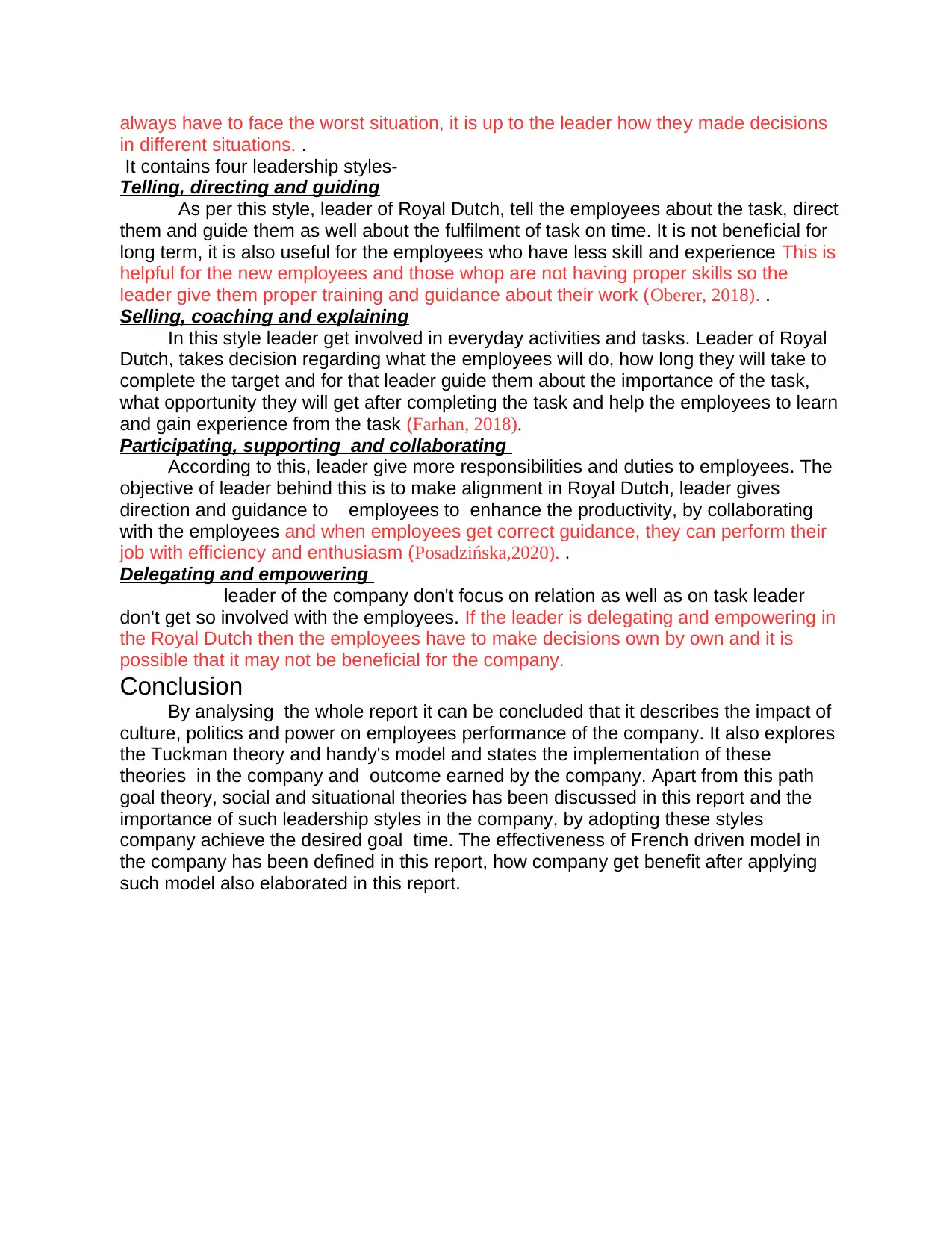
always have to face the worst situation, it is up to the leader how they made decisions
in different situations. .
It contains four leadership styles-
Telling, directing and guiding
As per this style, leader of Royal Dutch, tell the employees about the task, direct
them and guide them as well about the fulfilment of task on time. It is not beneficial for
long term, it is also useful for the employees who have less skill and experience This is
helpful for the new employees and those whop are not having proper skills so the
leader give them proper training and guidance about their work (Oberer, 2018). .
Selling, coaching and explaining
In this style leader get involved in everyday activities and tasks. Leader of Royal
Dutch, takes decision regarding what the employees will do, how long they will take to
complete the target and for that leader guide them about the importance of the task,
what opportunity they will get after completing the task and help the employees to learn
and gain experience from the task (Farhan, 2018).
Participating, supporting and collaborating
According to this, leader give more responsibilities and duties to employees. The
objective of leader behind this is to make alignment in Royal Dutch, leader gives
direction and guidance to employees to enhance the productivity, by collaborating
with the employees and when employees get correct guidance, they can perform their
job with efficiency and enthusiasm (Posadzińska,2020). .
Delegating and empowering
leader of the company don't focus on relation as well as on task leader
don't get so involved with the employees. If the leader is delegating and empowering in
the Royal Dutch then the employees have to make decisions own by own and it is
possible that it may not be beneficial for the company.
Conclusion
By analysing the whole report it can be concluded that it describes the impact of
culture, politics and power on employees performance of the company. It also explores
the Tuckman theory and handy's model and states the implementation of these
theories in the company and outcome earned by the company. Apart from this path
goal theory, social and situational theories has been discussed in this report and the
importance of such leadership styles in the company, by adopting these styles
company achieve the desired goal time. The effectiveness of French driven model in
the company has been defined in this report, how company get benefit after applying
such model also elaborated in this report.
in different situations. .
It contains four leadership styles-
Telling, directing and guiding
As per this style, leader of Royal Dutch, tell the employees about the task, direct
them and guide them as well about the fulfilment of task on time. It is not beneficial for
long term, it is also useful for the employees who have less skill and experience This is
helpful for the new employees and those whop are not having proper skills so the
leader give them proper training and guidance about their work (Oberer, 2018). .
Selling, coaching and explaining
In this style leader get involved in everyday activities and tasks. Leader of Royal
Dutch, takes decision regarding what the employees will do, how long they will take to
complete the target and for that leader guide them about the importance of the task,
what opportunity they will get after completing the task and help the employees to learn
and gain experience from the task (Farhan, 2018).
Participating, supporting and collaborating
According to this, leader give more responsibilities and duties to employees. The
objective of leader behind this is to make alignment in Royal Dutch, leader gives
direction and guidance to employees to enhance the productivity, by collaborating
with the employees and when employees get correct guidance, they can perform their
job with efficiency and enthusiasm (Posadzińska,2020). .
Delegating and empowering
leader of the company don't focus on relation as well as on task leader
don't get so involved with the employees. If the leader is delegating and empowering in
the Royal Dutch then the employees have to make decisions own by own and it is
possible that it may not be beneficial for the company.
Conclusion
By analysing the whole report it can be concluded that it describes the impact of
culture, politics and power on employees performance of the company. It also explores
the Tuckman theory and handy's model and states the implementation of these
theories in the company and outcome earned by the company. Apart from this path
goal theory, social and situational theories has been discussed in this report and the
importance of such leadership styles in the company, by adopting these styles
company achieve the desired goal time. The effectiveness of French driven model in
the company has been defined in this report, how company get benefit after applying
such model also elaborated in this report.
Paraphrase This Document
Need a fresh take? Get an instant paraphrase of this document with our AI Paraphraser
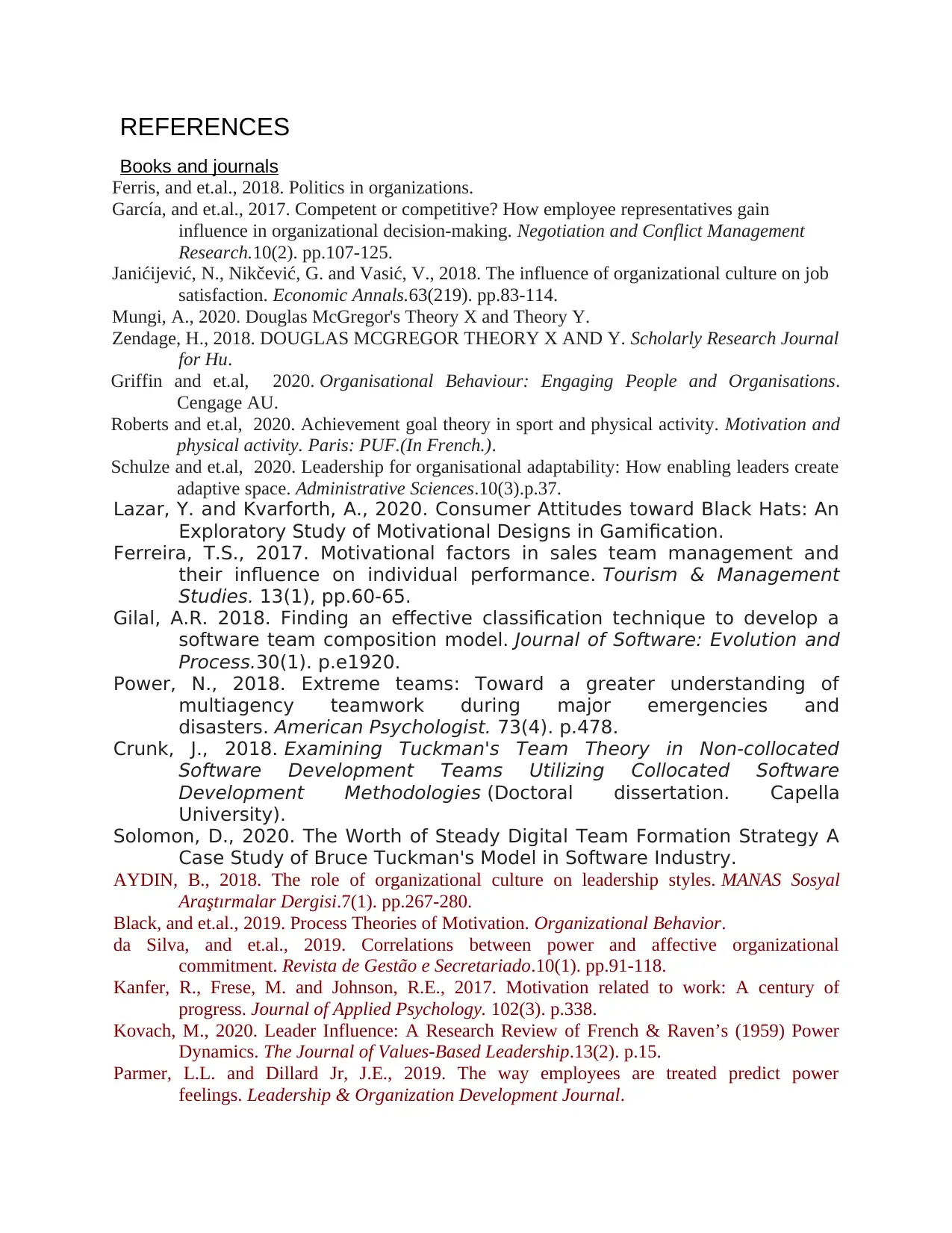
REFERENCES
Books and journals
Ferris, and et.al., 2018. Politics in organizations.
García, and et.al., 2017. Competent or competitive? How employee representatives gain
influence in organizational decision‐making. Negotiation and Conflict Management
Research.10(2). pp.107-125.
Janićijević, N., Nikčević, G. and Vasić, V., 2018. The influence of organizational culture on job
satisfaction. Economic Annals.63(219). pp.83-114.
Mungi, A., 2020. Douglas McGregor's Theory X and Theory Y.
Zendage, H., 2018. DOUGLAS MCGREGOR THEORY X AND Y. Scholarly Research Journal
for Hu.
Griffin and et.al, 2020. Organisational Behaviour: Engaging People and Organisations.
Cengage AU.
Roberts and et.al, 2020. Achievement goal theory in sport and physical activity. Motivation and
physical activity. Paris: PUF.(In French.).
Schulze and et.al, 2020. Leadership for organisational adaptability: How enabling leaders create
adaptive space. Administrative Sciences.10(3).p.37.
Lazar, Y. and Kvarforth, A., 2020. Consumer Attitudes toward Black Hats: An
Exploratory Study of Motivational Designs in Gamification.
Ferreira, T.S., 2017. Motivational factors in sales team management and
their influence on individual performance. Tourism & Management
Studies. 13(1), pp.60-65.
Gilal, A.R. 2018. Finding an effective classification technique to develop a
software team composition model. Journal of Software: Evolution and
Process.30(1). p.e1920.
Power, N., 2018. Extreme teams: Toward a greater understanding of
multiagency teamwork during major emergencies and
disasters. American Psychologist. 73(4). p.478.
Crunk, J., 2018. Examining Tuckman's Team Theory in Non-collocated
Software Development Teams Utilizing Collocated Software
Development Methodologies (Doctoral dissertation. Capella
University).
Solomon, D., 2020. The Worth of Steady Digital Team Formation Strategy A
Case Study of Bruce Tuckman's Model in Software Industry.
AYDIN, B., 2018. The role of organizational culture on leadership styles. MANAS Sosyal
Araştırmalar Dergisi.7(1). pp.267-280.
Black, and et.al., 2019. Process Theories of Motivation. Organizational Behavior.
da Silva, and et.al., 2019. Correlations between power and affective organizational
commitment. Revista de Gestão e Secretariado.10(1). pp.91-118.
Kanfer, R., Frese, M. and Johnson, R.E., 2017. Motivation related to work: A century of
progress. Journal of Applied Psychology. 102(3). p.338.
Kovach, M., 2020. Leader Influence: A Research Review of French & Raven’s (1959) Power
Dynamics. The Journal of Values-Based Leadership.13(2). p.15.
Parmer, L.L. and Dillard Jr, J.E., 2019. The way employees are treated predict power
feelings. Leadership & Organization Development Journal.
Books and journals
Ferris, and et.al., 2018. Politics in organizations.
García, and et.al., 2017. Competent or competitive? How employee representatives gain
influence in organizational decision‐making. Negotiation and Conflict Management
Research.10(2). pp.107-125.
Janićijević, N., Nikčević, G. and Vasić, V., 2018. The influence of organizational culture on job
satisfaction. Economic Annals.63(219). pp.83-114.
Mungi, A., 2020. Douglas McGregor's Theory X and Theory Y.
Zendage, H., 2018. DOUGLAS MCGREGOR THEORY X AND Y. Scholarly Research Journal
for Hu.
Griffin and et.al, 2020. Organisational Behaviour: Engaging People and Organisations.
Cengage AU.
Roberts and et.al, 2020. Achievement goal theory in sport and physical activity. Motivation and
physical activity. Paris: PUF.(In French.).
Schulze and et.al, 2020. Leadership for organisational adaptability: How enabling leaders create
adaptive space. Administrative Sciences.10(3).p.37.
Lazar, Y. and Kvarforth, A., 2020. Consumer Attitudes toward Black Hats: An
Exploratory Study of Motivational Designs in Gamification.
Ferreira, T.S., 2017. Motivational factors in sales team management and
their influence on individual performance. Tourism & Management
Studies. 13(1), pp.60-65.
Gilal, A.R. 2018. Finding an effective classification technique to develop a
software team composition model. Journal of Software: Evolution and
Process.30(1). p.e1920.
Power, N., 2018. Extreme teams: Toward a greater understanding of
multiagency teamwork during major emergencies and
disasters. American Psychologist. 73(4). p.478.
Crunk, J., 2018. Examining Tuckman's Team Theory in Non-collocated
Software Development Teams Utilizing Collocated Software
Development Methodologies (Doctoral dissertation. Capella
University).
Solomon, D., 2020. The Worth of Steady Digital Team Formation Strategy A
Case Study of Bruce Tuckman's Model in Software Industry.
AYDIN, B., 2018. The role of organizational culture on leadership styles. MANAS Sosyal
Araştırmalar Dergisi.7(1). pp.267-280.
Black, and et.al., 2019. Process Theories of Motivation. Organizational Behavior.
da Silva, and et.al., 2019. Correlations between power and affective organizational
commitment. Revista de Gestão e Secretariado.10(1). pp.91-118.
Kanfer, R., Frese, M. and Johnson, R.E., 2017. Motivation related to work: A century of
progress. Journal of Applied Psychology. 102(3). p.338.
Kovach, M., 2020. Leader Influence: A Research Review of French & Raven’s (1959) Power
Dynamics. The Journal of Values-Based Leadership.13(2). p.15.
Parmer, L.L. and Dillard Jr, J.E., 2019. The way employees are treated predict power
feelings. Leadership & Organization Development Journal.
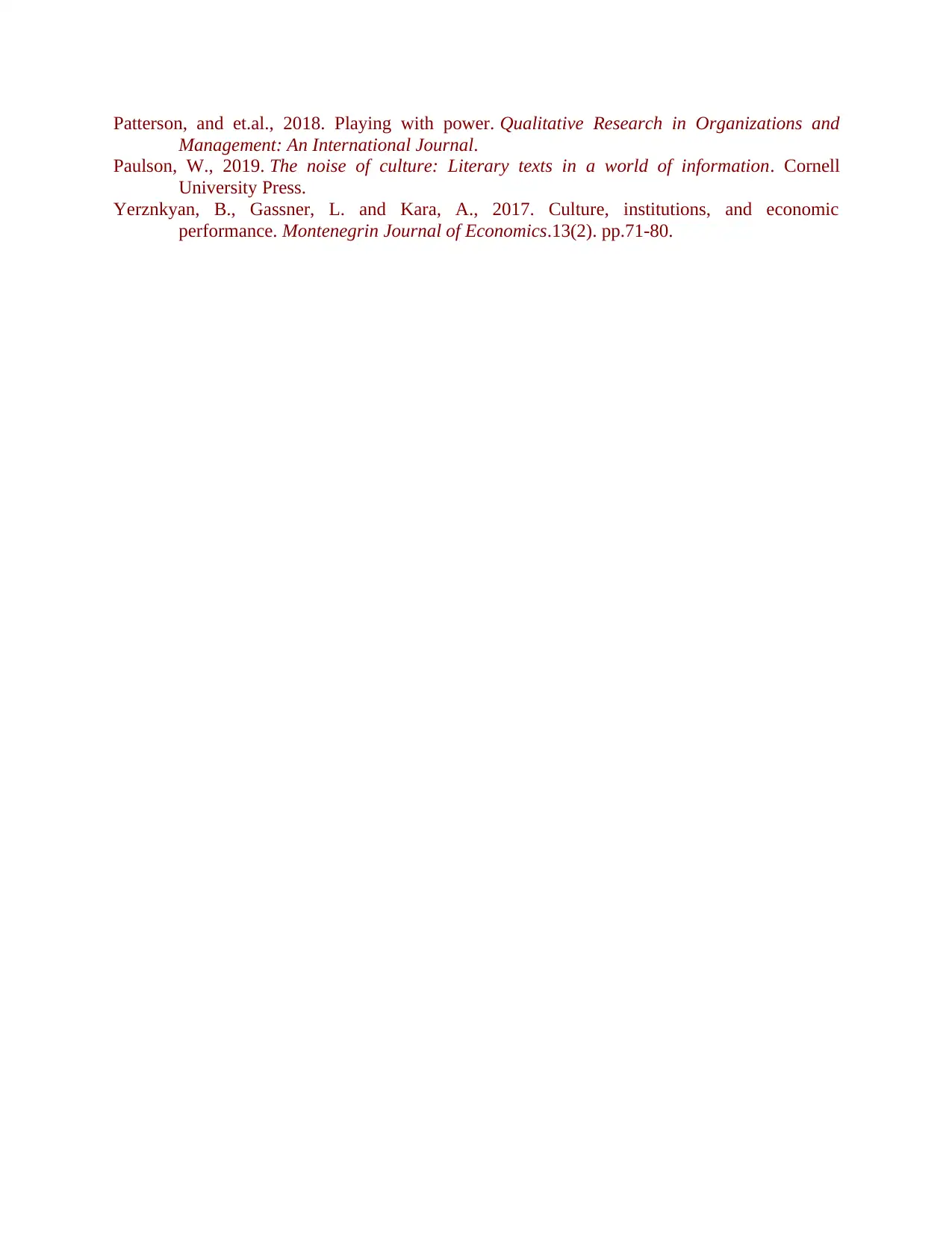
Patterson, and et.al., 2018. Playing with power. Qualitative Research in Organizations and
Management: An International Journal.
Paulson, W., 2019. The noise of culture: Literary texts in a world of information. Cornell
University Press.
Yerznkyan, B., Gassner, L. and Kara, A., 2017. Culture, institutions, and economic
performance. Montenegrin Journal of Economics.13(2). pp.71-80.
Management: An International Journal.
Paulson, W., 2019. The noise of culture: Literary texts in a world of information. Cornell
University Press.
Yerznkyan, B., Gassner, L. and Kara, A., 2017. Culture, institutions, and economic
performance. Montenegrin Journal of Economics.13(2). pp.71-80.
⊘ This is a preview!⊘
Do you want full access?
Subscribe today to unlock all pages.

Trusted by 1+ million students worldwide
1 out of 12
Related Documents
Your All-in-One AI-Powered Toolkit for Academic Success.
+13062052269
info@desklib.com
Available 24*7 on WhatsApp / Email
![[object Object]](/_next/static/media/star-bottom.7253800d.svg)
Unlock your academic potential
Copyright © 2020–2026 A2Z Services. All Rights Reserved. Developed and managed by ZUCOL.





